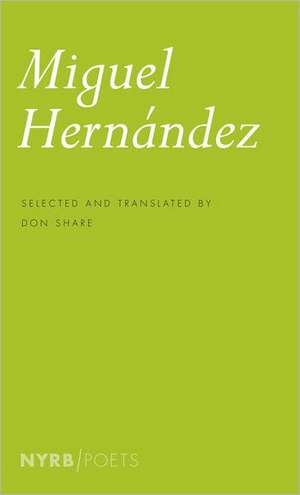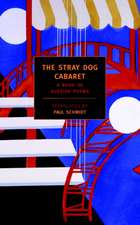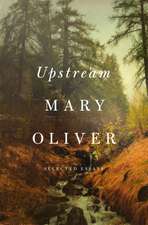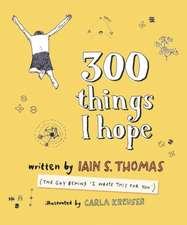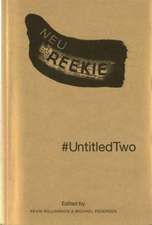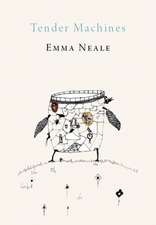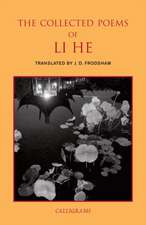Miguel Hernandez: NYRB/Poets
Autor Miguel Hernandez Traducere de Don Shareen Limba Engleză Paperback – apr 2013
Preț: 74.26 lei
Nou
Puncte Express: 111
Preț estimativ în valută:
14.21€ • 14.87$ • 11.80£
14.21€ • 14.87$ • 11.80£
Carte disponibilă
Livrare economică 12-26 martie
Livrare express 26 februarie-04 martie pentru 13.73 lei
Preluare comenzi: 021 569.72.76
Specificații
ISBN-13: 9781590176290
ISBN-10: 1590176294
Pagini: 113
Dimensiuni: 117 x 178 x 5 mm
Greutate: 0.09 kg
Editura: NEW YORK REVIEW OF BOOKS
Seria NYRB/Poets
ISBN-10: 1590176294
Pagini: 113
Dimensiuni: 117 x 178 x 5 mm
Greutate: 0.09 kg
Editura: NEW YORK REVIEW OF BOOKS
Seria NYRB/Poets
Notă biografică
Miguel Hernández Gilabert (1910ߝ1942) was born into a poor family in the city of Orihuela in southern Spain. His father raised goats and sheep, and Hernández was brought up to be a shepherd. At age eleven, he entered the Jesuit Colegio de Santo Domingo, where he learned to read and write, and started to compose poems whose uncanny virtuosity and wild inspiration earned the admiration of Pablo Neruda and Federico García Lorca. With the outbreak of the Spanish Civil War in 1936, his poetry took on a new public dimension, and Hernández would soon enlist in the Republican Army. In 1937, he married Josefina Manresa Marhuenda, the love of his life. The couple lost their first son to malnutrition; a second, Manuel Miguel, was born in 1939. After the defeat of the Republic, Hernández was condemned to death for his poetry by Francisco Franco, who called him “an extremely dangerous man,” a sentence that was subsequently reduced lest he become a martyr like Lorca. Hernández, imprisoned under brutal conditions and suffering from an advanced case of tuberculosis, continued to write until his death on March 28, 1942; he was thirty-one years old.
Don Share is the senior editor of Poetry magazine. His books of poetry include Squandermania, Union, and most recently, Wishbone. He is the editor of Seneca in English, Bunting’s Persia, and with Christian Wiman, The Open Door: One Hundred Poems, One Hundred Years of Poetry Magazine. His translations of Miguel Hernández were awarded the Times Literary Supplement Translation Prize and the Premio Valle
Inclán.
Don Share is the senior editor of Poetry magazine. His books of poetry include Squandermania, Union, and most recently, Wishbone. He is the editor of Seneca in English, Bunting’s Persia, and with Christian Wiman, The Open Door: One Hundred Poems, One Hundred Years of Poetry Magazine. His translations of Miguel Hernández were awarded the Times Literary Supplement Translation Prize and the Premio Valle
Inclán.
Extras
A man-eating knife
A man-eating knife
with a sweet, murdering wing
keeps up its flight and gleams
all around my life.
A twitching metal glint
flashes quickly down,
pricks into my side,
and makes a sad nest in it.
My temples, flowery balcony
of a younger day,
are black, and my heart,
my heart is turning grey.
Such is the evil ability
of this enveloping beam
that I go back to my youth
like the moon goes to a city.
I gather with my eyelashes
salt from my soul, salt from my eye,
and gather blossoming spiderwebs
of all my sadnesses.
Where can I be
that I will not find loss?
Your destiny is the beach,
my calling is the sea.
To rest from this hurricane
work of love or hell
is impossible, and the pain
makes sorrow last and last.
But at last I will win out,
worldly bird and ray,
heart, because in death
there is no doubt.
So go on, knife, and slash
and fly: and then one day
time will yellow
on my photograph.
Lightning that never ends
Will this lightning never end, that fills
my heart with exasperated wild beasts
and furious forges and anvils
where even the freshest metal shrivels?
Will it never quit, this stubborn stalactite,
tending its stiff tufts of hair
like swords and harsh bonfires
inside my heart, which bellows and cries out?
This lightning never ends, or drains
away: from me alone it sprang, it trains
on me alone its madness.
This obstinate rock sprouts
from me, and turns on me the insistence
of its rainy, shattering bolts.
Your heart is a frozen orange
Your heart is a frozen orange.
No light gets in; it is resinous, porous,
golden: the skin promises
good things to the eye.
My heart is a feverish pomegranate
of clustered crimson, its wax opened,
which could offer you its tender pendants
lovingly, persistently.
But how crushing it is to go
to your heart and find it frosted
with sheer, terrifying snow!
On the fringes of my grief
a thirsty handkerchief
hovers, hoping to drink down my tears.
You threw me a bitter lemon
You threw me a bitter lemon
from a hand so warm and pure
that I tasted the bitterness
without spoiling its architecture.
With a yellow jolt, my sweet
and lazy blood turned hot, possessed,
and so I felt the bite
of the tip of that long, firm teat.
But glancing at you and seeing the smile
that this lemon condition produced
(so at odds with my greed and guile),
my blood blacked out inside my shirt,
and through that porous golden breast
I felt a pointed, dazzling hurt.
A man-eating knife
with a sweet, murdering wing
keeps up its flight and gleams
all around my life.
A twitching metal glint
flashes quickly down,
pricks into my side,
and makes a sad nest in it.
My temples, flowery balcony
of a younger day,
are black, and my heart,
my heart is turning grey.
Such is the evil ability
of this enveloping beam
that I go back to my youth
like the moon goes to a city.
I gather with my eyelashes
salt from my soul, salt from my eye,
and gather blossoming spiderwebs
of all my sadnesses.
Where can I be
that I will not find loss?
Your destiny is the beach,
my calling is the sea.
To rest from this hurricane
work of love or hell
is impossible, and the pain
makes sorrow last and last.
But at last I will win out,
worldly bird and ray,
heart, because in death
there is no doubt.
So go on, knife, and slash
and fly: and then one day
time will yellow
on my photograph.
Lightning that never ends
Will this lightning never end, that fills
my heart with exasperated wild beasts
and furious forges and anvils
where even the freshest metal shrivels?
Will it never quit, this stubborn stalactite,
tending its stiff tufts of hair
like swords and harsh bonfires
inside my heart, which bellows and cries out?
This lightning never ends, or drains
away: from me alone it sprang, it trains
on me alone its madness.
This obstinate rock sprouts
from me, and turns on me the insistence
of its rainy, shattering bolts.
Your heart is a frozen orange
Your heart is a frozen orange.
No light gets in; it is resinous, porous,
golden: the skin promises
good things to the eye.
My heart is a feverish pomegranate
of clustered crimson, its wax opened,
which could offer you its tender pendants
lovingly, persistently.
But how crushing it is to go
to your heart and find it frosted
with sheer, terrifying snow!
On the fringes of my grief
a thirsty handkerchief
hovers, hoping to drink down my tears.
You threw me a bitter lemon
You threw me a bitter lemon
from a hand so warm and pure
that I tasted the bitterness
without spoiling its architecture.
With a yellow jolt, my sweet
and lazy blood turned hot, possessed,
and so I felt the bite
of the tip of that long, firm teat.
But glancing at you and seeing the smile
that this lemon condition produced
(so at odds with my greed and guile),
my blood blacked out inside my shirt,
and through that porous golden breast
I felt a pointed, dazzling hurt.
Recenzii
“In Miguel’s earthy and wild poetry all the extravagances of color, of perfume, and of the voice of the Spanish Levant came together, with the exuberance and the fragrance of a powerful and virile youth.” —Pablo Neruda
“Miguel Hernández sang in his deep voice and his singing was as though all the trees were singing.” —Octavio Paz
“In Don Share’s translations of Miguel Hernández, there is a sense of shared elation between reader and translator that confirms the delight of exact sensation when the poem feels transmitted by that cautious and subtle alchemy that is the translator’s skill.” —Derek Walcott
“The consumate poet of light, darkness, soul, time, death.” —Willis Barnstone
“The apparent simplicity of his poems, which speak eloquently of love, poverty and hope, turned Hernández into a popular figure who was elevated to cult status.” —El Pais
“Raw, passionate, despairing and celebratory.” —Publisher’s Weekly
“What a victory it is to watch springing forth from our murky thicket of half-commercialized poetry the silver boar of Hernández's words—to see the world of paper part so as to allow the language tusks and shoulders to emerge, shining, pressed forward by his genius.” —Robert Bly
“One of the great talents of the century.” —Philip Levine, The Kenyon Review
“ A cherished example of why great poetry is timeless." —Ray Gonzalez, Bloomsbury Review
“Miguel Hernández sang in his deep voice and his singing was as though all the trees were singing.” —Octavio Paz
“In Don Share’s translations of Miguel Hernández, there is a sense of shared elation between reader and translator that confirms the delight of exact sensation when the poem feels transmitted by that cautious and subtle alchemy that is the translator’s skill.” —Derek Walcott
“The consumate poet of light, darkness, soul, time, death.” —Willis Barnstone
“The apparent simplicity of his poems, which speak eloquently of love, poverty and hope, turned Hernández into a popular figure who was elevated to cult status.” —El Pais
“Raw, passionate, despairing and celebratory.” —Publisher’s Weekly
“What a victory it is to watch springing forth from our murky thicket of half-commercialized poetry the silver boar of Hernández's words—to see the world of paper part so as to allow the language tusks and shoulders to emerge, shining, pressed forward by his genius.” —Robert Bly
“One of the great talents of the century.” —Philip Levine, The Kenyon Review
“ A cherished example of why great poetry is timeless." —Ray Gonzalez, Bloomsbury Review
